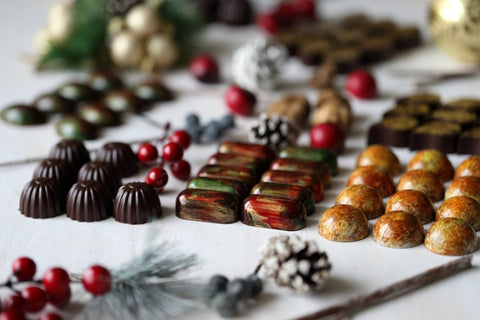
Poisoning in dogs: six festive hazards to avoid
Almost a third (29%) of UK pet owners admit that they have fed their dogs something ‘toxic’ and, with the festive season upon us, there are some surprising festive foods that aren’t safe for your dog to consume. With many families across the UK set to take their dogs on holiday over the festive season, it’s best to be safe and avoid an unwanted vet visit.
Dog-friendly holiday lettings company, Canine Cottages, polled pet owners across the nation about their pet feeding habits and found that 47% of people wouldn’t be able to recognise symptoms of poisoning in their dogs.
The company also teamed up with Josh Walker, a specialist at Anderson Moores Veterinary Specialists, part of the veterinary group, Linnaeus, to find out which toxic foods we should keep out of our dogs’ reach this Christmas.
Macadamia nuts
There’s always a bowl of nuts lying around at Christmas but try to keep these well away from your dog. Josh explains: “Whilst it is tempting to reach for the nutcracker, be aware that macadamia nuts are surprisingly toxic to dogs. Signs may be seen within one to six hours, even at low doses.

“The most common signs to look out for include weakness, depression, vomiting, poor coordination and balance, tremoring, high body temperature, joint/muscle pain, and inability to rise. Typically, patients improve within 48 hours but may require supportive care and cooling.”
Gravy
Christmas dinner isn’t complete without a good helping of homemade gravy, but whilst you might want to treat your pup to a ‘mini Christmas dinner’ this year, be aware of the ingredients you’re using.
“Some gravies may be safe, however, gravy that contains onion powder should not be fed to dogs. Small volumes are unlikely to cause significant harm; but, onions contain a toxin called n-propyl disulphide and thiosulfates which cause damage to the red blood cell.
“It can cause a breakdown of the red blood cells, leading to anaemia (low red blood cells). Other systems, including gastrointestinal, urinary, cardiovascular, and respiratory, can also be affected as a result of the toxic process. All forms of onion (and garlic) are toxic. In fact, garlic can be up to five times more toxic than onions,” Josh explains.

Alcohol
It goes without saying that alcohol shouldn’t be a part of your dog’s diet, but you may not think that leaving a glass of your favourite tipple lying around could cause too much damage. Josh advises: “Ethanol-containing products can cause a variety of issues that mainly affect the brain and nervous system. Alcoholic beverages and raw fermenting doughs are classic culprits, but de-icers often contain methanol, which is also toxic.
“Signs of consumption include depression, ataxia (poor coordination and balance), lethargy, sedation, nausea, vomiting, and metabolic changes, such as a low body temperature. Your pet’s breath may smell like alcohol, or you may find a chewed bottle.”
Christmas pudding and mince pies
These Christmas classics are eaten throughout the festive season and may seem harmless. However, Josh explains some surprising facts about our fruity favourites: “Ingestion of fruits of the Vitis family – or grapevine – including grapes, raisins, sultanas, and currants, may cause significant toxicity in some dogs.
“Signs of ingestion may initially include lethargy, reduced appetite, vomiting and diarrhoea. Kidney failure or liver failure may develop and any changes in water intake or urination should be discussed with your local vet.”

Chocolate
It’s a widely known fact that you should never allow your dog to eat chocolate but with so many sweet treats lying around throughout the festive season, you’ll need to be extra vigilant around your dogs.
Here, Josh explains the signs to look out for: “Chocolate contains theobromine, a stimulant similar to caffeine. The degree of toxicity will depend on the type of chocolate eaten, but generally, the higher the cocoa percentage the more concerning consumption will be.
“The onset of clinical signs of chocolate consumption in dogs is rapid and may include gastrointestinal upset, cardiovascular abnormalities, such as an abnormal heart rate and rhythm, urinary incontinence, increased drinking and urination, hyperexcitability, poor coordination and balance, and seizures. Symptoms usually appear around two-to-four hours after ingestion and chocolate may be smelt in the vomit/diarrhoea.”

If your dog does, unfortunately, get hold of some chocolate: “It is highly recommended that you keep the packaging of any chocolate products for your vet, as it can be used to estimate the amount eaten,” Josh adds.
Christmas plants
Clearly, they’re not something we’d choose to eat but to some dogs, especially young pups, even plants are worth a taste!
Josh explains that some of our favourite Christmas plants can cause issues for our dogs: “Mistletoe, poinsettia, holly and ivy can all leave your dog with an upset stomach so they’re best placed well out of reach.”
If you’d like to give your dog a healthy Christmas treat this year, Josh explains the foods that are safe for canine consumption: “Small amounts of cooked vegetables such as potatoes, sprouts and parsnips are typically well tolerated, though avoid rapid diet changes in pets that have sensitive stomachs.

“We would always stress that owners should seek veterinary care if they are concerned and that keeping hold of packaging or ingredient lists of anything of concern is useful so that a vet can examine the label.”
To read more on the research and to use the interactive tool that highlights more harmful foods and the symptoms they can cause, please visit: https://www.caninecottages.co.uk/toxic-food-for-dogs
